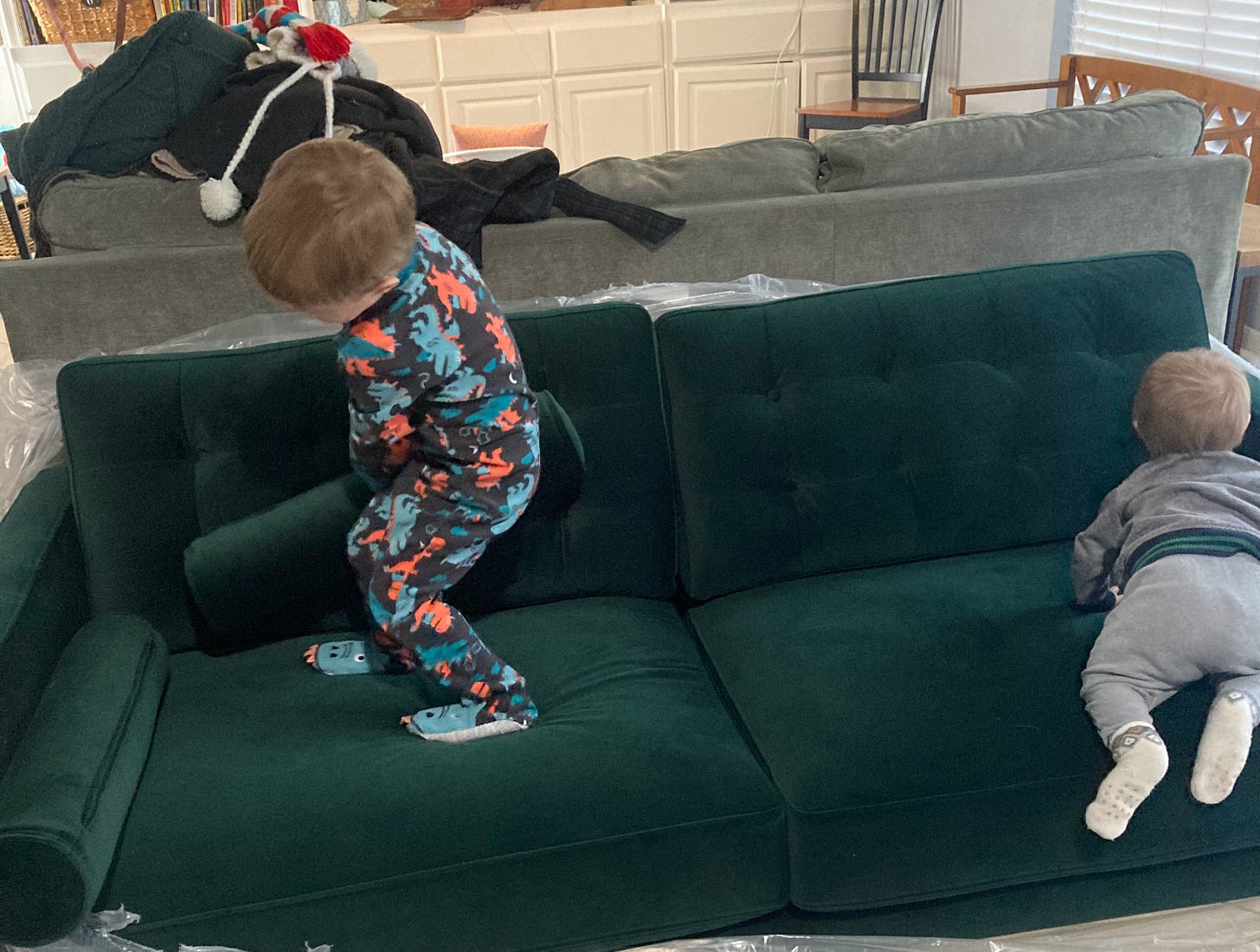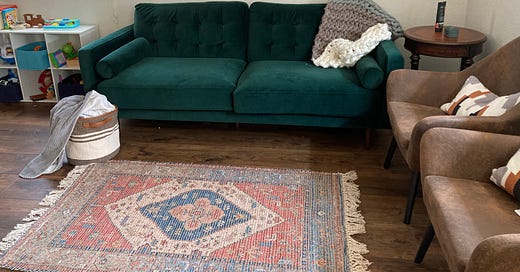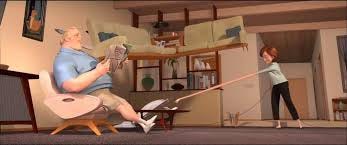Our Marriage Vs. The Green Couch
The time moving furniture made me question my husband's love for me
“I think I’m going to have to get it up on the roof,” Joseph said as he brought the couch inside.
It was February 2021, and I’d convinced Joseph we needed the green velvet couch for our recently renovated upstairs. The doorway for the stairs is at an awkward angle off the kitchen, the sort of clumsy layout you could expect from a 1970s-addition complete with green carpet, popcorn ceiling, and fluorescent lighting. Joseph had been devoting all his spare time to the project for several months. I’d mostly kept my involvement to helpful design suggestions like, “I think you’re really going to have to replace the moulding too, babe.” The green couch was my final proposal, a pop of color to the neutral color-palette we’d chosen, and Joseph had graciously agreed to it.
But as he tested the width of the couch against the stair doorway, he shook his head.
“It’ll fit if we remove the packaging,” I insisted.
“I don’t think so. The doorway’s the problem.”
“Which is why it’ll fit if we take off all this extra plastic and cardboard. We have to at least try—how would you even get it on the roof?”
“Toss it.” Joseph shrugged. I glared, knowing he wasn’t entirely kidding.
Another quirk of our upstairs is a door that leads straight onto a flat section of roof. When we bought the house, Joseph liked the potential for an outdoor balcony, but it’s one project at a time in our 1950s fixer-upper. By the look on his face now, I could tell he was excited about climbing on the roof. I imagined the scene playing out in his mind: Joseph hoisting the couch like Mr. Incredible having an easy workout.
I was not so keen, especially since outside was a slushy mess after the snowstorms that had ravaged Texas that month. Our anxiety about the statewide disaster chafed against the cabin fever, the tedium of keeping a two-year-old and a ten-month-old entertained inside. The couch delivery was the most positive excitement we’d had all week. I was sure the stairs were the most expedient route for my highly-anticipated sofa.
So, I had us unwrap the couch in the kitchen while the baby napped and the toddler watched Daniel Tiger. I pictured us maneuvering the emerald sofa to just the right angle, squeezing it through the doorway, and effortlessly carrying it the rest of the way up the stairs (cue Ross Geller, “Pivot! Pivot!”).
“I’m telling you, this is mathematically impossible,” Joseph said as we inched the couch into the space between the fridge and the doorway. Joseph gets this expression when he’s trying not to upset me: an angle of the mouth that’s something between an uncomfortable smirk and a twitch of abject terror. Joseph does not like conflict. He knew I was going to be disappointed if he couldn’t fit it
“You’re just saying that because you want to carry it onto the roof,” I said.
“No, I’m not. I’m saying it’s the only way.”
And though I knew he was right—though I knew it wasn’t his fault—I was mad at him. I knew he wasn’t telling me something, and his obvious evasion irritated me.
Over the past few weeks, I had felt like Joseph wasn’t telling me things. It wasn’t like I thought he was concealing a gambling addiction or an affair, but the discrepancies still gave me doubts about our relationship.
He didn’t tell me he’d be working late. So, while he sighed over Excel sheets, I juggled dinner, toddler tantrums that rivaled Mt. Vesuvius, and a baby practicing his drumming skills in the pots and pans cabinet. This after a day purgatorial in the number of messes cleaned, nonfood objects extracted from mouths, answers to meaningful questions like, “Mama, why you got a nose?” The promise of five o’clock had been my redemption, now cruelly postponed.
On another occasion: Joseph hadn’t mentioned how stressed he was. So, a peaceful weekend turned tense because he was morose and withdrawn and I didn’t know why. My prying only increased the tension between us.
My resentment grew out of my fear that he didn’t love me enough to tell me what was going on in his life. As a writer focusing on the problems that crop up in families through what we don’t say, I worried where his reticence might take us. Joseph was so attentive when we were dating, but five years into marriage and I sensed him pulling away.
But then, when I stopped to think about it, I felt guilty for being upset. I knew his work was more than Zoom meetings and pivot tables. He liked his job, but mostly he kept it because we had two kids and a mortgage. If he was burned out, it was because he always took the morning shift with the baby and tried to give me a break from diaper duty and nap-time negotiations on the weekends.
So, was I being unfair, having unrealistic expectations of his availability? We talked and talked, as much as two overworked, sleep-deprived parents could, and decided it was about communication. If he would communicate his work schedule in advance, I could mentally prepare for long days. If he could let me know when he needed a break, I wouldn’t be confused by my normally chipper husband turning into Marvin from The Hitchhiker’s Guide to the Galaxy. Communication would save us, just like the marriage prep books had promised.

But then the green couch came and my worries returned. Why couldn’t he just confess, “Yes, darling, I actually am suppressing some boyish enthusiasm to implement this ridiculous plan” ? Ultimately, I needed him to be honest with himself so he could be honest with me. That he wasn’t sharing his emotions seemed to me some failing in his love for me.
I realize I’m talking about a couch, meanwhile overlooking my astonishing fortune to be concerned about a couch while millions in my state were without power and water from the brutal snowstorms of that year. But the week itself had been nudging me toward an edge, especially after our pandemic year. I was witnessing again the threadbare fabric that holds together the convenient world we imagine is so impervious. A few streets over and we might have been struggling just to keep our babies warm. Our pipes might have burst, flooding this home we’ve worked so hard to renovate. If the couch seemed small, isn’t it so often the small things that become tipping points, letting fall free our deepest anxieties?
When Joseph didn’t tell me how much he needed a physical challenge, how excited he was to do some unconventional problem-solving, it seemed like he didn’t trust me with his feelings. I couldn’t help fearing this implied a deeper unraveling between us.
And I realized that at the heart of every argument—however mundane, however weighty—was that fundamental question: does he still love me?
But Joseph often loves through actions rather than vulnerability. I am learning to trust that he loves me even if he can’t always say it through emotional intimacy. Ultimately, he wanted to give me what I wanted: a green couch in our upstairs, even if that meant carrying said couch onto the roof.
I realized he was telling me he loved me, just not through a litany of his feelings.
And I realized that at the heart of every argument—however mundane, however weighty—was that fundamental question: does he still love me?
Even now, three+ years after the green couch event, I’m still learning to accept that there will always be divergences in the modes we use to convey our love and our needs, little tears along the seams of our relationship that threaten to unravel us. But the point of marriage, the point of love, is that we’ve chosen to stay, fixing those tears when they are big enough to do real harm, but overlooking them (at least trying to) when they aren’t actually going to destroy us.
In other words, I’m learning to trust that our love for one another can withstand the small disagreements and disputes.
After we conceded defeat to the stairway, we put the couch, sans legs, in the living room. The boys quickly turned it into a jungle gym, climbing over the plush velvet and scaling the button-tufted cushions.

“What if we can never get it upstairs?” I said.
“Then I guess we’ll just have two couches down here,” Joseph said.
I dragged my hand down my face. The green couch did not match our living room décor.
“Hey,” said Joseph, putting both hands on my shoulders, the weight of his touch its own reassurance. “I’ll get it up there.”
He waited until the snow had mostly melted, but I still removed the cushions to keep them from falling in the mud-slush. With the help of two friends and a ladder, he hauled the couch up and inside. It went more smoothly than anticipated, and I could see how proud Joseph was of the feat. But then I noticed the slit in the fabric of the box spring.
“Was that rip there before?” I asked when our friends were gone. I knew it hadn’t been. I knew it had torn on a sharp edge of the roof. I only wanted to hear how Joseph felt about it.
“No, but it’s fine. You can’t see it with the cushions,” Joseph said. When he finished putting the legs on the couch, he sat down, arms spread on the backrest, leg propped in overdramatic James Bond-style. Though he hates conflict, he does enjoy it when I roll my eyes at him.
As I sat down beside him, I thought of how he was evading guilt about the tear. I contemplated voicing my frustration, but I knew fixing the gash would involve replacing or at least moving the couch. And there was no way we were getting it back downstairs. It was there to stay, so I overlooked the tear.
Nearly four years later, the couch is still there, its integrity unmarred by the rip, forgotten except for the rare times we remove the cushions to vacuum the crumbs away.
PS. There are a few ways you can interact with this post, all of which I appreciate so much. You can leave a comment or a heart, share this post with friends, or message me directly!
PPS. In this month of gratitude, a paid subscription will include an original short story about friendship and love, as well as a gratitude writing prompt for all ages.





